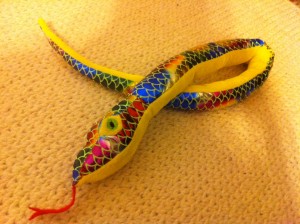 We spent Sunday at the Reading Fair. This has become one of our summer traditions, an annual August pilgrimage to ride the rides, look at the livestock, and eat less-than-virtuous things.
We spent Sunday at the Reading Fair. This has become one of our summer traditions, an annual August pilgrimage to ride the rides, look at the livestock, and eat less-than-virtuous things.
We also, each year, wind up playing carnival games. The kids beg to do this, but only certain games — the ones where you win a prize every time. It can be a completely crappy prize (we have our share of small stuffed snakes). I explained the way it works; while standing in the shade of one carnival game I overheard the two workers discussing that there were actually no duckies you could pick that would win you the giant prizes. You had to trade up to get one of those. And yet the kids desperately wanted to “win” and have some tangible relic of their day at the fair.
I’ve spent money on worse things in life than making my kids happy, so we ponied up. And it kind of makes me happy to have them happy. In that sense, I suppose, money buys happiness.
I was thinking of that today as I went to the Philadelphia Museum of Art. I promised myself a trip there as a reward if I cranked through the multitude of words I had due today (well, end of week. But I no longer work on Fridays). I finished writing by noon. I finished up my calls by about 1:30. So I drove downtown to check out the Impressionists exhibit.
It was lovely. So much light and color in a few galleries. In that way money was buying me happiness again, though it was a sunk cost (we’re museum members — a strategic choice we’ve made to encourage us to go more often). But there was a more interesting story about money and satisfaction that was part of the exhibit itself.
This massive collection of Impressionist paintings — masterpieces by Monet, Corot, Degas, Pissarro, Renoir, et al — is presented from the perspective of art dealer Paul Durand-Ruel. A widower with five children, he was taken with the new painting techniques stirring in Paris in the mid/late 1800s, and he used his resources to nurture artists’ careers. He’d buy up everything from a painter to corner the market, and then stage strategic exhibitions and curate conversations about the artists to make their work more valuable. He became friends with many of them, and paid them stipends when the art establishment refused to showcase or support their work. His investment has now given the world an untold amount of beauty.
His money has bought happiness.
Of course, it’s easy to spend money and have nothing much come out of it. I’m gathering another bag of stuff to donate to Big Brothers Big Sisters: a leather jacket I spotted and loved in a Norwegian boutique, and then never wore. But pleasure isn’t nothing, and sometimes the pleasure that comes from strategic spending is quite profound.
Photo: Carnival stuffed snake. It came pre-ripped; my 5-year-old demanded it be mended as soon as we walked in the door. Fortunately, I mend pretty well. My 7th grade home ec teacher told me my button sewing was the best she had ever seen. I kid you not.
